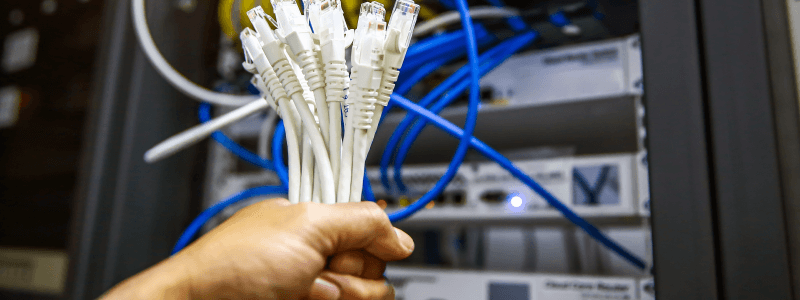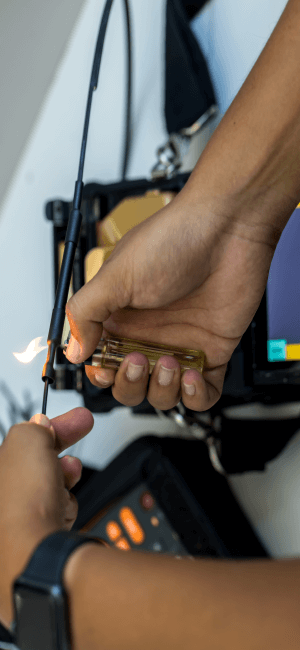What's all the fuss about fiber optic internet service?

Matthew Harrington

Fiber optic internet is the newest, fastest way to get online. If you're looking for a reliable, high-speed connection, fiber is the way to go. But what is fiber optic internet, and why is it so popular?
Fiber is the new generation of communication — fast, reliable and it's worth all it promises. You'd be searching long and hard before you find something that stands up to it. Although other internet connections are great, they're significantly slower than fiber and if they use copper cables, their reliability isn't nearly the same. We're all looking for faster broadband options and fiber seems to be the solution to our need for uninterrupted, HD streaming in our downtime.
But what exactly is all the fuss about? Here's everything you need to know about this cutting-edge technology.
What is fiber optic internet and what's all the fuss about?
Fiber optic internet is a type of broadband connection that uses fiber optic cables to transmit data. It's one of the fastest, most reliable ways to connect to the internet, with speeds up to 10 times faster than traditional cable connections.
So why should you care about fiber optic internet? If you're looking for a fast, reliable connection, fiber is the way to go. Whether you're streaming movies, gaming online, or working from home, a fiber optic connection can handle all your internet needs.
How does fiber optic internet connection work?
Fiber optic internet uses a network of thin fibers to deliver data at high speeds. These fibers are much thinner than traditional copper cables, which means they can carry more data and offer faster speeds.
To get fiber optic internet in your home, you'll need a fiber-optic modem and a router. The modem connects to the fiber network and the router distributes the signal to your devices.
The advantages of fiber optic internet
There are many benefits of fiber optic internet, including:
- Fast speeds: With fiber optic internet, you can get speeds up to 10 times faster than traditional cable connections.
- Reliable connection: Fiber optic internet is one of the most reliable types of broadband connections. It's not susceptible to weather conditions or interference from other electronic devices.
- Affordable: Fiber optic internet is often more affordable than other types of broadband connections, such as satellite or DSL.
The downside of fiber optic internet
The only downside of fiber optic internet is that it's not available in all areas. If you live in a rural area, you may not be able to get a fiber optic connection.
How fiber compares to other connections
Fiber optic internet is the fastest type of broadband connection, but it's not the only option. Here's a look at how fiber compares to other types of connections:
Cable
Cable connections are faster than DSL, but they're not as fast as fiber. They're also less reliable and can be affected by weather conditions.
DSL
DSL is a type of broadband connection that uses copper wires. It's not as fast as fiber, but it's more affordable and widely available.
Satellite
Satellite connections are available in rural areas where other types of broadband connections are not. They're also very fast, but they can be affected by weather conditions.
How to find fiber optic internet in my area
Fiber optic internet is available in many areas, but not all. To find out if it's available in your area, enter your zip code on our website. We'll show you a list of providers and plans that are available in your area.

How do I choose the right fiber optic internet plan?
There are a few things to consider when choosing a fiber optic internet plan. First, think about your needs. If you're a heavy internet user, you'll need a plan with higher speeds. Second, consider the price. Fiber optic plans can be cheaper than traditional cable plans, but they vary depending on the provider and the area you live in.
Finally, make sure to read the fine print. Some fiber optic plans come with data caps, which means you could be charged extra if you go over your limit.
Top fiber internet providers and their packages
Not sure which fiber optic internet provider to choose? Here's a look at some of the top providers and their plans:
AT&T Fiber: offers speeds up to 1,000 Mbps. Plans start at $60 per month.
CenturyLink: offers speeds up to 1,000 Mbps. Plans start at $49 per month.
Comcast Xfinity: offers speeds up to 2,000 Mbps. Plans start at $70 per month.
Verizon Fios: offers speeds up to 940 Mbps. Plans start at $39.99 per month.
Google Fiber: offers speeds up to 1,000 Mbps. Plans start at $50 per month.
Fiber's download and upload speeds
Most providers offer upload and download speeds of up to 100Mbps, with some even offering 1Gbps.
Fiber FAQs
Q: How do I install fiber for my home internet?
A: You'll need a fiber-optic modem and a router. The modem connects to the fiber network and the router distributes the signal to your devices.
Q: How much does fiber optic internet cost?
A: Fiber optic plans can be cheaper than traditional cable plans, but they vary depending on the provider and the area you live in.
Q: How can I upgrade my fiber speed?
A: Contact your provider to see if you can upgrade your speed.
Q: How are fiber cables better than traditional copper cables?
A: Fiber cables are made of glass, which doesn't degrade over time like copper cables. They're also not susceptible to weather conditions or interference from other electronic devices.
Q: How can I troubleshoot my fiber internet speed?
A: If you're having trouble with your fiber internet speed, contact your provider. They can help you troubleshoot the issue.
Other ways you can troubleshooting your fiber internet connections
-Check the modem and router
-Make sure that the cables are properly plugged in
-Check for any software updates
-Reset the modem and router
Q: What can I do with a fiber internet connection?
A: A fiber internet connection can be used for anything that requires an internet connection. This includes streaming video, downloading music, browsing the web, and more.
Q: Does cold or hot weather affect my fiber connection?
A: Cold weather can actually improve your fiber connection because the glass fibers contract in cold weather, which makes them more efficient. However, hot weather can cause the opposite effect and slow down your connection.
Q: How long does fiber optic internet installation take?
A: It typically takes about two weeks to install fiber optic internet. However, the time frame can vary depending on the provider and the area you live in.
Q: What are the different types of fiber internet?
A: There are two types of fiber internet: symmetrical and asymmetrical. Symmetrical fiber internet is the same speed for both uploads and downloads. Asymmetrical fiber internet is faster for downloads than it is for uploads.
Q: Which of the two types of fiber should I choose?
A: Symmetrical fiber internet is the better option if you need to upload large files or use video conferencing. Asymmetrical fiber internet is better for general browsing and streaming.
Q: Is fiber a good option for household internet or is it better for businesses?
A: Fiber is a good option for both households and businesses. It's the fastest type of internet connection, so it can handle anything you throw at it. Whether you're working from home or streaming 4K video, fiber can do it all.
Q: How much data can I use with a fiber internet connection?
A: Most fiber internet plans have unlimited data, so you can use as much as you want without having to buffer.
Q: Does fiber use an ethernet cable?
A: No, fiber uses a different type of cable than ethernet. Ethernet cables are made of copper and fiber cables are made of glass.
Q: How can I test the speed of my fiber internet connection?
A: There are a few different ways to test the speed of your fiber internet connection. You can use an online speed test, download a speed test app, or run a speed test on your computer.
Q: Is fiber the same as wi-fi?
A: No, fiber is a type of internet connection and wi-fi is a wireless network. Fiber uses cables to connect to the internet, while wi-fi broadcasts a signal that your devices can connect to.
Q: What happens if a fiber cable is damaged?
A: If a fiber cable is damaged, it needs to be repaired or replaced. This can be done by a professional or by a provider.

Sign up for fiber with HomeLinkd
If you've been wondering what all the fuss is about, we hope this article has helped you understand why fiber-optic internet is a big deal.
While this wireless network has some astonishing download speeds, sadly its high-speed internet access is not widely available yet. Those in rural areas will have to opt for other options until this tech's availability grows.
If you want to know more about fiber connectivity and other new technology on the market, visit our website. We publish articles about the fastest internet options across the country.










